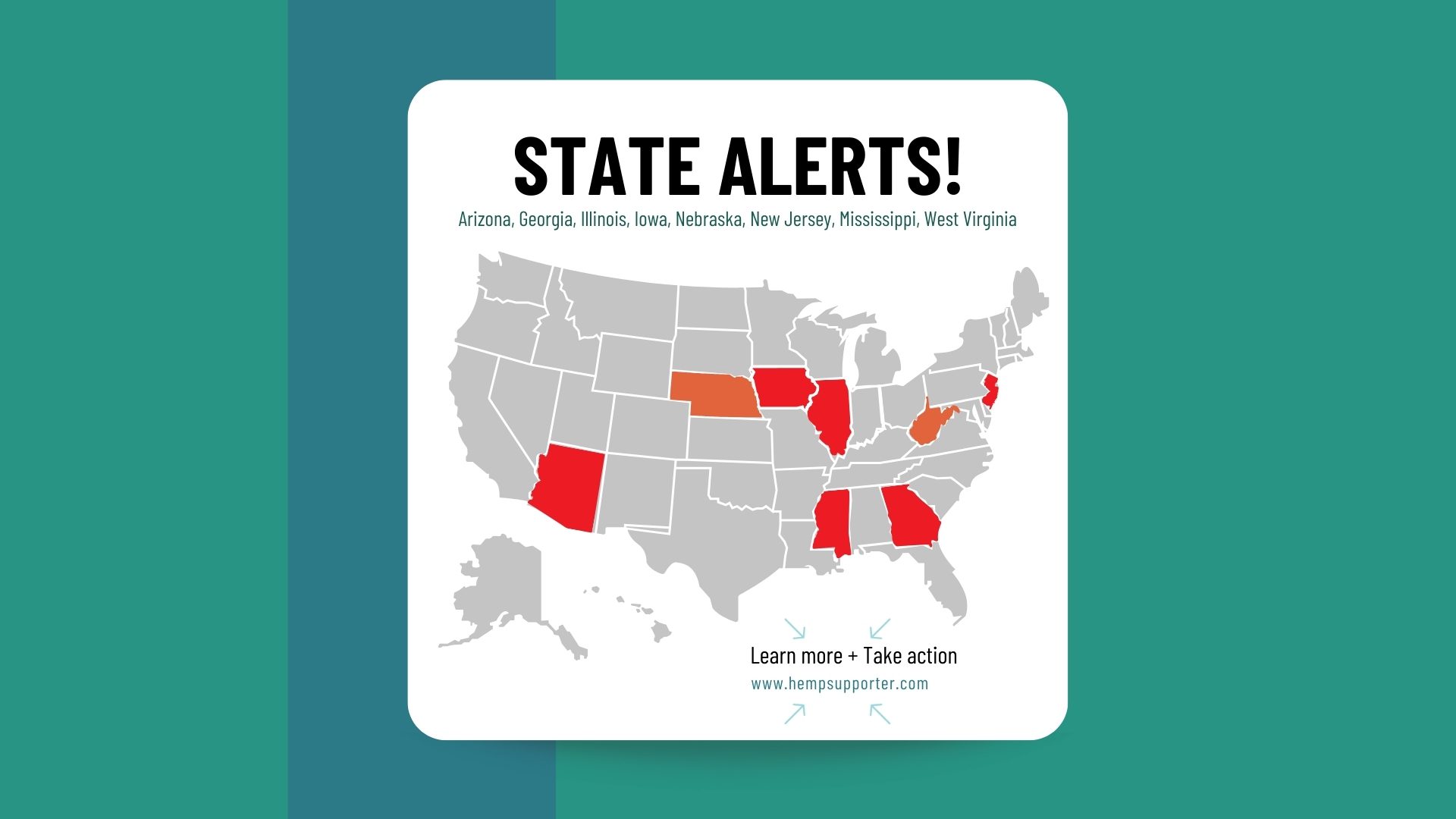INDUSTRY UPDATES
February 24, 2024
Age Restrictions for Non-Intoxicating Hemp Products & Other Updates

Check out the latest legislative updates across the states and take action today!
Age Restrictions – Multi Sate
Bills in FIVE states would impose unfair age restrictions for most or all types of hemp products, including CBD.
Arizona
SB 1186 would restrict all hemp-derived products to persons 21 or older and would create packaging and other requirements.
Georgia
HB 1127 and SB 437 are companion bills that would prohibit the sale of consumable hemp products to persons under 21, including non-intoxicating products like CBD. The legislative intent is similar to SB 350, a bill we have previously flagged for Georgia Hemp Supporters.
Illinois
HB 5306 & SB 3790 are companion bills that would prohibit the sale of consumable hemp products to persons under 21, including non-intoxicating products like CBD.
Iowa
Two sets of companion bills – HF 2605 & SF 2352 and HSB 665 & SSB 3159 – would prohibit the sale of consumable hemp products to persons under 21, including non-intoxicating products like CBD.
New Jersey
A 3580 and S 2313 are companion bills in both legislative chambers would prohibit the distribution or sale of any product that contains any amount of THC to persons under 21.
These bills must be defeated. A 21-or-older age restriction for legal hemp-derived products that are safe and pose no risk of intoxication is unwise policy and likens hemp-derived CBD to impairing substances like alcohol. We encourage Hemp Supporters in Arizona, Georgia, Illinois, Iowa, and New Jersey to use our State Action Center to urge legislators to oppose the bills.
Mississippi
RED ALERT: HB 1676 is yet another piece of legislation proposed by marijuana monopolists and prohibition advocates to destroy the legal hemp product market – adult and non-intoxicating — by setting highly unreasonable THC limits on products. A consumable product that contains more than 0.5mg of total THC per serving, or more than 2.5mg of total THC per package or CBD-to-THC ratio that is greater than 20:1 would be classified as an “intoxicating hemp product.” Such products may only be sold by a licensed cannabis dispensary. Total THC would include all forms of THC, including delta-9, delta-8, delta-10, and delta-6. Additionally, the bill limits all consumable hemp products, including non-intoxicating products, to persons 21 or older and prohibits the manufacture, production, or sale of any hemp product that contains an artificially derived cannabinoid.
Hemp Supporters in Mississippi are encouraged to use our State Action Center to urge legislators to oppose the bill.
Georgia
There are other new bills worth monitoring. Also in Georgia, consumable hemp products are attracting even more attention. HB 1322 establishes a standard by which delta-9 THC concentration is established for purpose of the total delta-9 THC concentration limit for consumable hemp products. The bill also imposes packaging requirements and advertising restrictions for consumable hemp products, and, after July 1, 2024, prohibits the new operation of a consumable hemp products retail store within 1,000 feet of any elementary or secondary school.
SB 494 would require consumable hemp product manufacturers, wholesalers, and retailers to have a license. Annual license fees would be set by the Commissioner of Agriculture. The fee for a manufacturer license would be $5,000, the fee for a retail license would range from $250-$4,000, and the fee for a wholesale license would range from $5,000-$10,000.
Nebraska
In Nebraska, LB 1341 would define hemp to include consumable hemp products, making it clear that such products may be commercially sold. The bill sets a 7.5% tax rate on consumable hemp product sales.
West Virginia
Finally, thanks to your efforts in West Virginia, a committee substitute to SB 679 removes the original bill’s 0.3% restriction for all hemp-derived cannabinoids. The latest version now primarily addresses other requirements, clarifying that hemp cannabinoid product manufacturers, processors, distributors, and sellers, including out-of-state distributors and sellers, are subject to permitting, labeling, and other administrative requirements. Requirements include that hemp business must obtain a business registration certificate and hemp cannabinoid products may not be sold without an approved label.
Visit our State Action Center to see active campaigns across the country!
Check out the latest hemp and CBD updates from across the states!
- Updates in DC, Iowa, New Jersey, and TennesseeCheck out the latest legislative updates across the states and take action today! Washington D.C. Things are heating up in the nation’s capital. We continue to hear about hemp stores facing action for selling legal …
- Bill Updates in California, Georgia, New Jersey, North Carolina, Ohio & Federal & State Enforcement ActionCheck out the latest legislative updates across the states and take action today! California As AB 2223 continues to pose an existential threat to the hemp products industry in California — capping hemp products …
- Updates in Arizona, Florida, Massachusetts, New York, North Carolina, and OhioCheck out the latest legislative updates across the states and take action today! Arizona We’re starting with good news. In Arizona, a coalition of Hemp Supporters killed the marijuana industry’s final effort …




